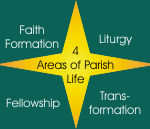

 |
|
 |
|
Homily for September 11th, 2005.
Caution: Putting a Sunday homily on the Website is tricky business. All the viewer has is a written text. A homily, on the other hand, is "an oral event". It may not have been said or heard the way it was written. In addition, a roughly ten-minute homily is part of a roughly one-hour worship event in which God and God's people communicate with each other by means of ritual, symbol, song, proclamation, prayer. Not everything in these homilies is original. As a homilist, I rely on and at times borrow from other homilists and writers who are not properly mentioned in this format. I am often indebted to them. Father William Marrevee, s.c.j.
24th Sunday Ordinary Time Year A Leave it to Peter to ask the most honest but also the most difficult questions: How often should I forgive a brother or sister who has deeply hurt me, offended me? Is seven times enough? Really, quite generous on the part of Peter. The answer of Jesus: Yes, Peter, you sound very generous. But since you ask me, what you really must do is multiply your generosity until you lose count. For as long as you count, you have not really forgiven. All you are doing is biding your time. Forgiving someone who has hurt us is very difficult; holding grudges, harbouring feelings of resentment and anger is so much more natural. How do we react to those who hurt us? In the circle of Jesus – and that is the circle we belong to, when you hear Paul in the second reading – what is called for is forgiveness. That has nothing to do with ignoring the wrong that has been done, the wound that has been inflicted. “Oh, I don’t let it bother me” is not the answer. The wound, the injury must be fully recognized. In the circle of Jesus, in the new world that the dead and risen Jesus has ushered in, sulking over it, seeking ways to retaliate or letting the other pay the price is not accepted. Why? We have to recognize that both the guilty party and the offended party threaten to become prisoners of the wrong done. The guilty party becomes the prisoner of the wrong done, when that person is forever defined by the wrong he or she has done. Mention that person’s name and the reaction is “that is the one who did this or that”. But the offended party may also become imprisoned by the wrong done, when he or she carries the burden of anger and revenge. The wrong done imprisons both. The issue is that both the offender and the offended one stand in need of liberation, both need to be set free from the wrong that has been done. Only forgiveness can do this. It operates from the assumption that both are greater than the wrong done and experienced, however difficult it may be to have that “being greater” break through. Nevertheless, based on that assumption Jesus calls us to forgiveness. On what grounds? The Gospel story suggests two:
|
|||||
| © Copyright 2025 Our Lady of Victory / St-Malachy Site
490 Charles Street • Gatineau • Quebec • J8L 2K5 Telephone: (819) 986-3763 Website powered by Arvixe Web Hosting |